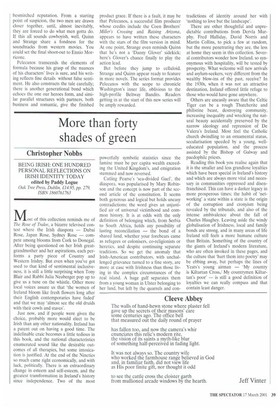More than forty shades of green
Christopher Nobbs
BEING IRISH: ONE HUNDRED PERSONAL REFLECTIONS ON IRISH IDENTITY TODAY edited by Paddy Logue Oak Tree Press, Dublin, £14.95, pp. 279, ISBN 1860761763 Most of this collection reminds me of The Rose of Tralee, a bizarre televised contest where the Irish diaspora — Dubai Rose, Japan Rose, Sydney Rose — compete among blooms from Cork to Donegal. After being questioned on her Irish greatgrandmother and her aspirations, each performs a party piece of Country and Western Irislay. But even when you've got used to that kind of sentimental inclusiveness, it is still a little surprising when Tony Blair and Rabbi Julia Neuberger pop up to give us a tune on the whistle. Other more local voices assure us that 'the women of Ireland bloom like fresh flowers long after their English contemporaries have faded' and that we may 'almost see the old druids with their cowls and staves'.
Just now, and if people were given the choice, probably more would elect to be Irish than any other nationality. Ireland has a patent out on having a good time. The indefinable craic becomes a little tedious in this book, and the national characteristics enumerated sound like the desirable outcomes of all therapies, but some intoxication is justified. At the end of the Nineties so much came right economically, and with luck, politically. There is an extraordinary change in esteem and self-esteem, and the greatest transformation in Ireland's history since independence. Two of the most
powerfully symbolic statistics since the famine must be per capita wealth exceeding the United Kingdom's, and emigration stemmed and now reversed.
Catling Pearse's 'sea-divided Gael', the diaspora, was popularised by Mary Robinson and the concept is now part of the second article of the constitution. It seems both generous and logical but holds uneasy contradictions; the word gives an unjustified air of universal victimhood and common history. It is at odds with the only definition of belonging which, from Serbia to South Africa, holds any possibility of lasting reconciliation — the bond of a shared land, whether your forebears came as refugees or colonisers, co-religionists or heretics, and despite continuing separate traditions. So we get the anomaly that Irish-American contributors, with unchallenged grievance turned to a fine story, are more at ease with Irishness than those living in the complex circumstances of the real island. A huge gulf separates them from a young woman in Ulster belonging to her land, but left by the quarrels and con
tradictions of identity around her with 'nothing to love but the landscape'.
There are other thoughtful and unpredictable contributions from Deryla Murphy, Fred Halliday, David Norris and Martin Collins, to pick a few at random, but the more penetrating they are, the less at home they seem in this collection. Several contributors wonder how Ireland, so synonymous with hospitality, will be tested by prosperity. What welcome will new arrivals and asylum-seekers, very different from the wealthy blow-ins of the past, receive? In the 1930s, when it was not an attractive destination, Ireland offered little refuge to those who would have gone anywhere.
Others are uneasily aware that the Celtic Tiger can be a rough Thatcherite and philistine beast, destroying community, increasing inequality and wrecking the natural beauty accidentally preserved by the narrow ideology and repression of De Valera's Ireland. Most feel the Catholic church dwindling to an ornamental status, secularisation speeded by a young, welleducated population, and the process assisted by the Bishop of Galway and paedophile priests.
Reading this book you realise again that it is the smaller and less grandiose loyalties which have been special in Ireland's history and which are always more vital and necessary in communities oppressed and disenfranchised. This can have a darker legacy in more prosperous times; the habit of `networking' a state within a state is the origin of the corruption and cronyism being revealed by the tribunals, and also of the intense ambivalence about the fall of Charles Haughey. Leaving aside the windy globalisation of Irishness, local and family bonds are strong, and in many areas of life Ireland still feels a more humane culture than Britain. Something of the country of the giants of Ireland's modern literature, who are often invoked in these pages, and the culture that 'hurt them into poetry' may be ebbing away, but perhaps the lines of Yeats's young airman — 'My country is Kiltartan Cross,/ My countrymen Kiliartan's poor' — is still a good definition of loyalties we can really compass and that contain least danger.


































































 Previous page
Previous page